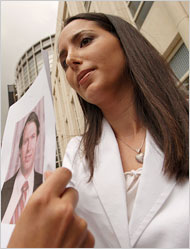June 6, 2006
![]()
By ALAN FEUER
Calling their crimes the “most heinous” he had ever seen in court, a federal judge issued — but did not officially impose — life in prison sentences yesterday for two retired New York detectives convicted in April of taking part in at least eight murders for the mob.
The sentencing of the men, Louis Eppolito and Stephen Caracappa, drew to a conditional close a stunning case of police corruption that began 20 years ago when they stopped a jeweler on the highway, helped to kill him and later left his body buried under concrete in an auto-body shop.
The judge, Jack B. Weinstein, issued the harshest penalty he could, but held up its imposition until he conducts a hearing later this month to determine if the men had shoddy lawyers, as they contend, and deserve a new trial.
There was little reaction from either man in Federal District Court in Brooklyn and both returned to jail, where Mr. Caracappa’s face has grown skeletal and Mr. Eppolito has grown a white goatee and gotten somewhat slimmer.
By law, the friends and family of a victim can address the court at sentencing, and before the penalty was read, there were brutally emotional — and achingly personal — accounts from the survivors.
One of them was Michal Weinstein, daughter of the jeweler, Israel Greenwald, who on Feb. 10, 1986, disappeared after giving young Michal a hug as she waited for a bus. She was 10 years old then, and as she spoke from the stand, addressing both defendants by name, it was with a caged fury that only now, after 20 years, had found release.
“You took away our daddy,” she said, “and by doing that you took away our childhood. You took away our mother. You stole our innocence. You filled our nights with nightmares and our days with torture.”
She posed a list of questions to the men: Did they know what it was like to be asked about your father and not have an answer? To be treated with fear and pity? To watch from the window as your mother’s car is repossessed? To leave the only home you ever knew and loved because you could not afford the mortgage? To take charity from the very charities your father once gave to? To visit a friend who had lost a loved one and be envious? Because they had a grave?
“To be envious of a grave,” she said.
It seemed impossible after such a speech for another syllable to be spoken, but three more family members of victims took the stand and then, sheepishly, Mr. Eppolito rose to speak.
He began contritely, saying that he understood the families’ pain and that, in 22 years as a detective, he had often had to deliver news about a death. He had knocked on doors, he said, had spoken to grieving widows — “I know the feelings.”
He then invited the families of his victims — the Greenwalds, the Hydells, the Linos — to visit him in jail, where he promised he could prove to them he was an innocent man.
It was at this point that without warning and certainly without permission, a large man wearing a seashell necklace suddenly stood up.
“Mr. Eppolito!” he yelled from the gallery. “Do you remember me?”
Apparently baffled, Mr. Eppolito said, “No.”
“I’m the guy you put away for 19 years! I’m Barry Gibbs! You don’t remember me? You don’t remember what you did to me? To my family?”
The marshals quickly led the man outside, as the courtroom burst into applause.
Mr. Gibbs went to prison 19 years ago for murder, but was released in September when a judge in Brooklyn found that Mr. Eppolito had intimidated the only eyewitness in the case into lying on the stand. Mr. Gibbs’s startling appearance put something of a kink in Mr. Eppolito’s speech, which he amended on the spot, repeating that he did not know the man.
Later, after Judge Weinstein issued the sentence (which, aside from life in prison, included a $1 million fine and a $400 special court fee), there was discussion of the next hearing, scheduled for June 23. At that time, it is likely that the defendants’ former lawyers, Bruce Cutler and Edward Hayes, will take the stand to be questioned on their legal work at trial.
As has happened often in the case, the various players spilled outside the courthouse to discuss things with the news media.
Mr. Gibbs, tanned and healthy, said that Mr. Eppolito had taken his “constitutional rights and put them in the street.”
He found a strange bedfellow in Anna Lino, wife of Edward Lino, whom Mr. Eppolito and Mr. Caracappa were found to have murdered 16 years ago.
“Nineteen years,” she said. “Don’t you think he has a right to have an outburst?”.

